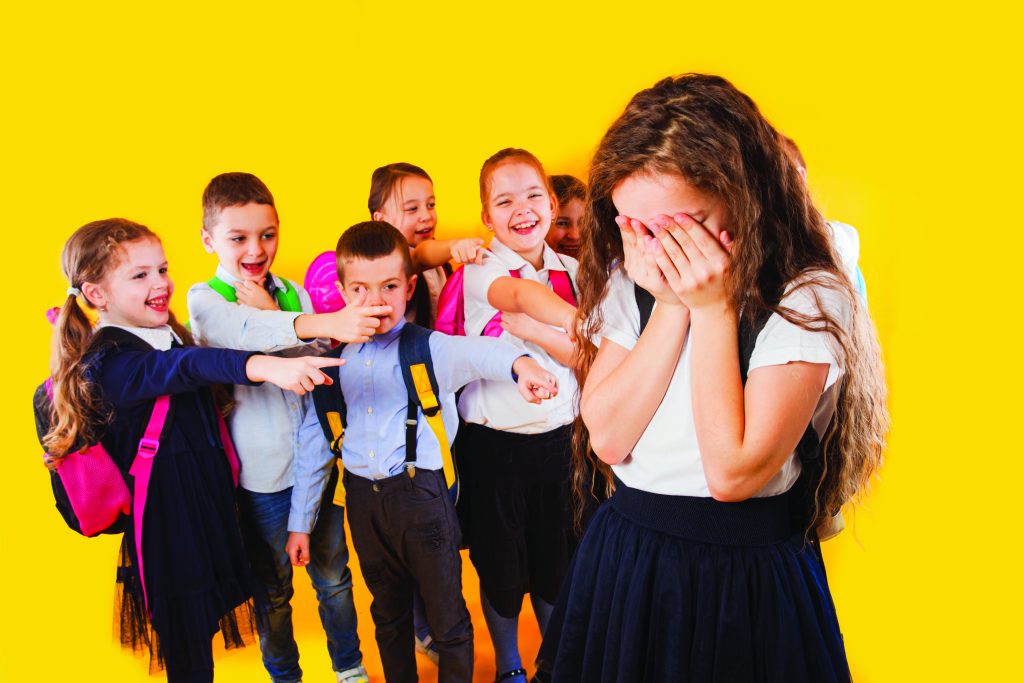How and what to know

October is National Bullying Prevention Month. It’s also the perfect time to discuss bullying issues with your children and let them know you, their teachers, and other adults in their lives are always available to lend support.
What constitutes bullying?
Aggressive behavior by one person against another is considered bullying. Threatening, spreading rumors, and attacking someone in word or deed also fit the definition. Bullies often hold some sort of power over their victims. Maybe they’re popular kids picking on those less wellliked; perhaps they’re lording over someone who has a disability or is simply somehow different.
It’s them, not you
Help your children understand that the bully is always the one at fault. If they become victims of an attack, equip them with the most important form of self-defense: self-esteem. Build your kids up daily with praise and help them understand why they’re the most wonderful people in the world. It won’t stop the bully from attacking, but it may blunt the sword.
Bullying as cybersport
Bullying has changed a lot over the past 20 years due to social media and the internet. Once you put something on the web, it generally lives forever. Cyberbullying occurs 24/7, and there’s no place to hide. A child’s safe space is gone. Kids used to get bullied at school or camp and were at least “safe” at home. These days, nasty messages and memes can occur anytime, which makes them much more destructive to a child’s self-esteem. Kids often gang up online attacking one unfortunate soul. And they can do it anonymously if they want and remain virtually untraceable. When someone teases someone in front of their face, there are ways to deescalate the attack in the moment. It’s not so easy on the web, when the person might not even know who’s creating the problem in the first place.
Show your kids how to fight back
Teach your children how to deflect bullying behavior. Roleplay and suggest ways to respond to a bully. Humor works well. Tell them to make a joke of it and simply walk away and to always try to stand tall and proud, as if being confronted by an angry bear. If they’re in some kind of physical danger, they should run. Or they should learn to defend themselves. Still, it’s better to neutralize a brute with brains rather than brawn. Tell them not to further antagonize the bully as it might cause the bully to lash back even more.
Teach your children well
It’s important to teach your children to stick up for the underdog. We’ve all experienced bullying behavior as children and even adults. Teach your children that what goes around usually comes around. If they stick up for someone in need now, hopefully, down the road, someone will speak up for them. Kids may feel powerless in an adult world. They have plenty of chances to use their strengths with their peers. What better way than to play the hero for someone deserving? Pay it forward. Good deeds often come back tenfold.
Teasing versus bullying
What’s the difference? And is either ever okay? No one likes to be teased; sometimes, though, it’s okay when the person being teased can join in and kid back in a light-hearted way. Or when the person can ask the teasers to stop and they do. A bully won’t stop simply because a child asks. No one has the right to be derogatory or pick on someone based upon their ethnicity or other individual traits. And all against one never feels okay. Constant teasing and/or bullying can inflict permanent scars that take years, if ever, to erase.
When your children bully another
If you learn that your children have bullied another, talk to your youngsters so they understand why the behavior occurred in the first place. If it continues, you might consider taking them to a therapist. Most bullies project their own feelings of distress. Help them know why they’ve done it.
It takes a community
Parents don’t always know what befalls their children each day. The best way to tell if your children are being bullied is to ask. Communicate regularly, as well, with other parents and teachers to nip bullying in the bud. Encourage your children to speak up if things get especially uncomfortable or dangerous. Let them know you’re always available to hear their side. Even if they’re doing the bullying, a little compassion may help save someone’s day.



